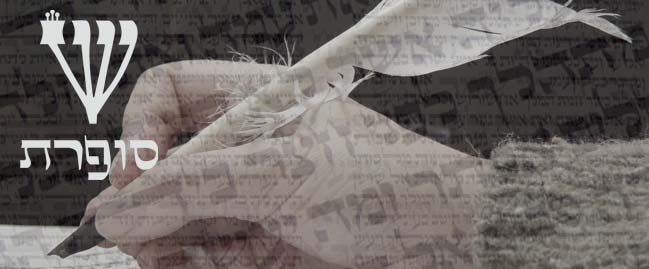RISE!
BS"D
An Orthodox Rebbetzin who I have learned much from & for whom I have unlimited respect is working on a project in Jerusalem. She is researching the minhag (tradition) quoted in the Ramah (R' Me'ir ben Todros HaLevi Abulafia of Spain 1180-1244) which says that women should not enter a beit kneset (synagogue) or touch a Sefer Torah or say G@d's name when she is in niddah (menstrual separation). Obviously I am fascinated by this, for the following reasons:
- If a woman came to shul 2 weeks on & 2 weeks off, that would tip her community off as to when she was in niddah. If she were a married woman, would this be considered appropriately tsenu'ah (modest/private) for everyone to know when she & her husband were able to be intimate, whether she was pregnant, etc?
- All Jews are considered to be in a spiritually impure state because of tamei meit (the tuma'a of a dead body). Why? Because even indirect contact with a corpse damages one's spirituality and places one in the most severe state of ritual impurity. As this tuma'a is easily spread & there is no way of keeping track of who is tamei & who isn't anymore, then it is supposed we all have it. To rid oneself of tamei meit required a unique purification process which we cannot perform today for lack of a red heifer, but that's another story. Since a Sefer Torah is not mekabel tuma'a (cannot be made impure), & since men are not considered tahor (pure) nowadays anyway, tuma'a (impurity) from women should not be an issue. That being said, I would like to state here that I do not so much as handle the qlaf (parchment) of the Sefer Torah I am writing while I am a niddah, as I understand that a complete Sefer which is kosher isn't mekabel tuma'a & my Sefer is not yet complete. I will write about sofrut & nidut in another post.
- If a woman cannot utter G@d's name when she is a niddah, then how can she fulfil her daily obligation to pray or even say the blessing on visiting the miqveh or when eating for that matter?
So, according to Rabbi Dr Daniel Sperber, this idea comes from a source that was quoted in writings for centuries, but that was only "discovered" in the late 1800's. The Sectarian text also says a lot of things that directly contradict the Rabbis (eg. a man can become impure by walking in a woman's footprints or by hearing her voice; a Niddah needs to have separate dishes, sheets, clothing, as well as her own room, & nobody can eat her cooking or benefit from her work [these two latter I'm sure being the reason that text never caught on]). The text then says, "Eilu Vi'eilu divrei Elokim chayim, v'halakhah k'beit Shammai b'chol makom" or, basically, that the law always follows Shammai, everywhere, and it is exactly the opposite of a source we have saying that the Halakhah always goes according to Hillel & not Shammai!
Many of the customs mentioned in the source, called "Baraita d' Masechet Niddah", are brought as Halakhah, but are later strongly rejected by other rabbis. Rav Ovadia Yosef, for instance, has a couple of Teshuvot where he is answering about people who have these customs who want to stop them, & Rav Yosef comes out very strongly that the sources are clearly against the Torah. My friend goes on to say, "I am really curious if he knew about the original source or if he just deduced it from the fact that it so clearly is [against Torah -- A.B.]. Anyway, it is really really interesting."
I have been told often by Jewish revisionists that later rabbis can never & do never dispute what earlier rabbis have stated. However, the more I learn Torah the more I see examples of this practice. Like how some people keep quoting the baraita to me about not allowing women to write Sifrei Torah, & yet there are Rishonim & Acharonim who permit it. Instead of making a valid argument to support their take on Judaism, they introduce false information at their convenience to quiet my voice & avoid having a meaningful debate. Judaism is not "pat". It deserves better from each of us than to bully another Jew into giving up their own unique insights & wisdom.
I am so interested in later rabbinic authorities coming out against earlier ones & how that has served to affect the way various Jewish communities live their Judaism. Can our paying attention to all rabbinic voices possibly help our tradition become more expansive while still remaining within the bounds of G@d's expectations of us as a community & as individuals?
I have full faith that we can rise to the challenge of supporting each individual Jew's dignity & place in our community, while still preserving not only the dignity of the community at large but also the ability to fulfill G@d's mitzvot with appropriate kavanah.
UPDATE, March 23rd
On women in niddah attending synagogue or saying G@d's name:
- Tzitzit Eliezer, Vol. 6 # 8 permits women in niddah to study Torah (a blessing must be said before engaging in the study of Torah).
- According to The Remah, Orach Chayim 88:1, when a woman is in niddah, she can enter a shul, pray & recite all blessings.
- The Mishnah Berurah states in 88:5 that a woman should not wait 40 days after the birth of a son or 80 after the birth of a daughter to enter a synagogue, as this practice has no basis in Jewish Law. It goes on to say in 88:6 that the consensus of later rabbis obligates women to pray & recite all brakhot while in niddah.
- A woman in niddah may pray at the Kotel (Western Wall) according to Yabiah Omer Vol. 5, Yoreh De'ah, # 27.
- The Magen Avraham 282:6 cites tractate Sofrim in obligating women to listen to the Torah reading on Shabbat. The Birkey Yosef, Orach Chayim 282:7 finds support for this view in the Tur, Orach Chayim 417.
Both men & women should look at the Sefer Torah when it is raised, because it is meritorious to see the letters of the Torah itself (Shulchan Arukh, Orach Chayim 134:2 & Mishnah Berurah 134:11)
- It is the tradition of Sephardic women to say the blessing on immersion before she enters the miqveh, with her head & body still covered (See Shulchan Arukh, Yoreh De'ah 220, Chokhmat Adam 121:14, Ben Ish Chai, Shanah Rishonah, Parshat Sh'mini, ch. 4 note 22.
- HaGaon Rav Shlomo Zalman Auerbach points out that even after giving birth a woman must light candles for Shabbat & recite the blessing.
On men hearing the words of women in niddah:
- Yabiah Omer, Vol. 1, # 15, rules that a man may listen to his wife sing when she is a niddah. See also the Be'er Sheva's opinion cited by the Ba'er Heytev, Even HaEzer 21:4.
- According to Shulchan Arukh, Orach Chayim 75:3 & Mishnah Berurah; Shevet HaLevi, Vol. 4, Orach Chayim, #14; Otzar HaPoskim 22:10; Kaf HaChayim, Orach Chayim 689:13, a man may listen to a woman speak in public or private.
On a niddah's cooking:
- A woman in niddah may separate challah & recite the appropriate blessing according to Rambam's Hilkhot Bikurim 5:12, Magen Avraham 263:6 & Remah, Orach Chayim 88.
UPDATE, March 24th
My Rebbitzen friend commented to me:
"In answer to your questions, they are exactly the point. The text that says these things seems to be a sectarian text-- either a remnant from the followers of Shammai, or pehaps more likely a later invention entirely. My question for my research is how on earth these customs found their way into our tradition in light of the questions you raised. In our class we have been addressing the question of whether or not a minhag can override halacha. Our teacher claims that ultimately it can't. I am exploring whether or not this is an example where it does. I will keep you posted."
UPDATE, March 25th
Various meanings for the shoresh, the root, "nadad" (Nun-Dalet-Dalet), from which the word "niddah" derives:
separate
wander
migrate
roam
unstable
restless
shift
move
remove














8 Comments:
- If a woman came to shul 2 weeks on & 2 weeks off, that would tip her community off as to when she was in niddah. If she were a married woman, would this be considered appropriately tsenu'ah (modest/private) for everyone to know when she & her husband were able to be intimate, whether she was pregnant, etc?
And if she were an unmarried woman, she would not be going to shul altogether, since unmarried women (generally speaking) do not immerse in a mikvah and therefore are always in niddah from the time of menarche until shortly before marriage (first immersion).
- If a woman cannot utter G@d's name when she is a niddah, then how can she fulfil her daily obligation to pray or even say the blessing on visiting the miqveh or when eating for that matter?
Is this part of why we immerse once first, then say the bracha, and then immerse again?
BS"D
That's true, shanna - thank you for clearly stating that issue as well.
I had in the back of my head Ramban's statement that, "an unmarried woman should not feel shame in front of her married sisters" by using a miqveh. I also know of miqva'ot which operate on a "don't ask, don't tell" basis so as to encourage all Jewish women who are having relations to do tevilah regardless of whether they are married. That way, karet is avoided, at least.
But you make a good point which means according to this minhag, all girls after their menarche would be prohibited from synagogue attendance until they were married (good bye, bat mitzvahs).
As for your second statement/question, I'm not sure. Certainly after one kosher dunk, we are not considered tahor yet, because the minimum is one, then brakhah, then one more. So food for thought...
Please don't stop!
I can't begin to tell you what it means to find a woman with heart and soul who is learned enough to do the legwork. Wow!
I am so grateful.
And oh, my dear, I adore the title.
BS"D
Thank you, Rachel. I am honoured.
BS"D
Thanks, Barefoot. You're making me blush :)
In response to Shanna's question about immersing once prior to the bracha, I have heard that it is done to parallel what a ger does; not being Jewish prior to dunking, the concept of brachos is not yet relevant for the ger (or geyoris).
Sounds like one of those "lo plug" [it doesn't matter, do it anyway] cases.
בס"ד
Well, we don't all do it that way - Sefardic minhag dictates that a woman stands before the miqveh, says the brakhah, then walks in & does her tevilot.
Post a Comment
<< Home